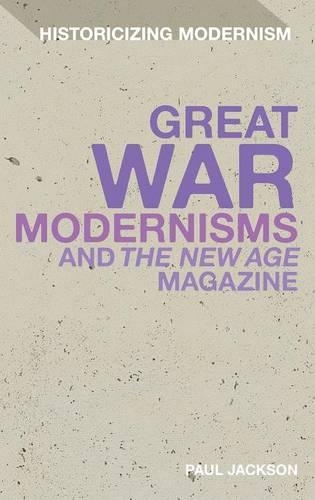
Great War Modernisms and 'The New Age' Magazine
(Hardback)
Available Formats
Publishing Details
Great War Modernisms and 'The New Age' Magazine
By (Author) Dr Paul Jackson
Continuum Publishing Corporation
Continuum Publishing Corporation
12th July 2012
United States
Classifications
Tertiary Education
Non Fiction
809.9112
Physical Properties
Hardback
192
Width 156mm, Height 234mm
432g
Description
The literary magazine The New Age brought together a diverse set of intellectuals. Against the backdrop of the First World War, they chose to write about more than modernist art and aesthetics. By closely reading and contextualizing their contributions, Paul Jackson's study engages with the political and philosophical responses of literary artists to modernity. Jackson demonstrates the need to interpret modernism not merely as an aesthetic phenomenon,but inherently linked to politics and philosophy. By placing the writing of a canonical modernist, Wyndham Lewis, against a figure usually excluded from the modernist canon, H.G. Wells, Jackson examines further a wartime modernism that embraced socialist and political views. This reinterpretation of modernism provides a historicised understanding of the politicised hopes of artists promoting revolutionary forms of cultural renewal. Considering modernist writers' relationship between politics,philosophy and aesthetics in the context of total war Jackson encourages new cultural-historical definitions of modernism. In addition this study provides the first close analysis of cultural contributions from a leading wartime Little Magazine, tracing the radical modernist debates that developed in its pages.
Reviews
'This is an intelligent and thought-provoking study which encourages us to rethink the meaning of 'modernism'. After reading Paul Jackson's book, historians and literary scholars will have to question the utility of a narrow, aesthetic definition of modernism. Jackson shows, in several fine case studies, that the concept has equal validity for exaplaining the many ways in which intellectuals and politicians were trying to make sense of a world in flux. Great War Modernisms is an important contribution to twentieth-century intellectual history.' -- Dan Stone, Royal Holloway, University of London, UK
Jackson explores the intense mood of expectancy of a new era induced in the generation of British intellectuals directly affected by the catastrophe of the First World War. In doing so he shows how a wide variety of longings for regeneration are linked with the radical experimentations in aesthetics, social organization, economics, and politics that fed into inter-war European thought - each of which are increasingly recognized as different manifestations of modernism. As a result, all too familiar 'English' figures suddenly appear in a fresh 'continental' light. This new approach hopefully signals a belated readiness of British cultural historians to break out of decades of self-imposed insularity and isolationism when considering Europe-wide cultures of modernism.' -- Professor Roger Griffin, Department of History, Oxford Brookes University, UK
Author Bio
Paul Jackson is Senior Lecturer in History at the University of Northampton, UK.
